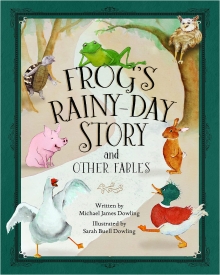Learn more about the journey that led to us equipping kids to carefully evaluate every idea they encounter.
Meet members of our team who have contributed to curriculum development.
Hear from real users of the Foundation Curriculum.
Learn what we believe about God, Jesus, Scripture, and more.

Frog’s Rainy-Day Story and Other Fables
Michael James Dowling
Children Ages 4-7
We do not often read fables with our children, but they can be a powerful way of teaching truth. Each of the fables in this book teaches a culturally-relevant truth that can help ground our children in reality. We recommend you read through this book with the children God has placed in your care, one story at a time, and take time to discuss the big truth revealed in each fable.
Question 1 - Read the big truth at the end of Frog’s Rainy Day Story. (We’re made for a much larger story, which we miss when we seek our own glory.) What are some of the ways we seek our own glory rather than letting God use us for His glory?
Discussion Guide - Discuss ways in which we strive for the spotlight: to be the best on the team, to receive the best grade in class, to make our lives look glamorous on social media, etc. Then discuss how you can strive to glorify God, rather than self, in each of these areas.
Question 2 - Read the big truth at the end of Duck’s Wrong Turn. (If there’s only one way, it’s foolish to say another way is okay.) What are some of the ways we see our culture claiming that untrue ideas are okay or even good?
Discussion Guide - Discuss how many people claim that all paths lead to God. But we do not see this in our current world. (Not all roads lead to Disney World or the Grand Canyon.) If working with older children, discuss how our society teaches that it is okay, even good, to change our bodies (our biological sex) to match our inner feelings (our supposed gender). But neither surgery nor hormones can alter the biological sex written on every cell in our bodies.
Question 3 - Read the big truth at the end of Turtle’s Favorite Turtle. (Those who puff themselves up in their own eyes are likely to have an unpleasant surprise.) What are some of the things we are tempted to falsely place our identity in rather than in our true identity as image-bearers of God?
Discussion Guide - Discuss how we are tempted to put our identity in our skills, our looks, our self-esteem, our financial status, etc. Discuss how all of these things are transient, but nothing can change the fact that we are image-bearers of the holy God.
Bonus Question - If your child has gone through Foundation Comparative Worldview Curriculum or Foundation Careful Thinking Curriculum, ask, “Where in these stories do we see the difference between objective truths and subjective emotions?”
Discussion Guide - Discuss how, in each of the fables, we saw the main characters following their subjective feelings, only to learn at the end that their feelings did not line up with what was objectively true.
Join the Foundation Worldview Book Club
Each month we provide recommended reading with discussion questions for you and your child. Don't miss next month's recommendations from Foundation Worldview!
